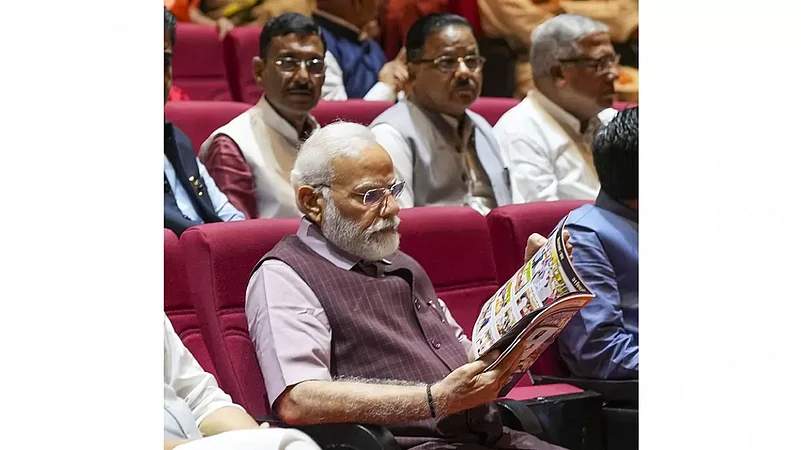As the Narendra Modi government faces its second no-confidence motion in the Lok Sabha amid the opposition's relentless demand for a comprehensive statement on the ongoing violence in Manipur, data compiled by a think tank shows that all no confidence motions have either been defeated or inconclusive in the past. However, on three occassions, governments have fallen during vote on a 'motion of confidence'.
Congress MP Gaurav Gogoi on Wednesday moved a no-confidence motion against the Modi government in the Lok Sabha on behalf of the opposition alliance, to force Prime Minister Narendra Modi to speak on the contentious Manipur issue. Lok Sabha Speaker Om Birla admitted the motion after a headcount of over 50 MPs as required under the rules.
What is a no-confidence motion?
A no-confidence motion is a formal proposal moved by a member against the government in Lok Sabha under Rule 198 of the Rules of Procedure and Conduct of Business in Lok Sabha. Although the no-confidence motion is bound to fail the numbers test, the opposition bloc Indian National Developmental Inclusive Alliance (INDIA) leaders argue that they will win the battle of perception by cornering the government on the Manipur issue and forcing Modi to speak on the matter in Parliament.
According to data compiled by PRS Legislative Research, the highest number of no-confidence motions - 15 - in the history of independent India was moved against governments led by Indira Gandhi.
First ever no-confidence motion
August 1963 - The first ever no-confidence motion was moved in the third Lok Sabha in August 1963 against Prime Minister Jawaharlal Nehru by Congress leader Acharya Kripalani. This was immediately after losing to China in the 1962 war. The debate went on for four days, for over 20 hours. Eventually, the motion was defeated, with only 62 MPs supporting it and 347 opposing it.
Indira Gandhi faced the most no-confidence motions
August 1966- Indira Gandhi, a Rajya Sabha MP at the time took over as the Prime Minister in January 1966. A no-confidence motion against her government was moved by Communist Party of India MP Hirendranath Mukherjee. The motion was supported by 61 MPs, while 270 MPs opposed it and the motion was defeated.
In November 1966 - Indira Gandhi's government faced a second no-confidence motion in a year, which was moved by UM Trivedi, noted lawyer and politician of Bharatiya Jan Sangh. The motion was defeated with 36 MPs supporting it, and 235 MPs voting against it. In March 1976 - In the fourth Lok Sabha, Atal Bihari Vajpayee had moved a no-confidence motion against the Indira Gandhi government. The trust vote took place on March 20, 1967, and 162 MPs voted against the government, while 257 voted in support. This was the highest number of votes polled in support of a no-confidence motion against the government till the time.
In all, Indira Gandhi faced 15 motions during her 16-year tenure (1966-77 and then from 1980 to her assassination in October 1984) as prime minister.
Government falls after no-confidence motion
In a first, in July 1979, a government was dislodged after a no-confidence motion. The motion was moved against Morarji Desai government by YB Chavan. Even though the debate remained inconclusive, Desai resigned from his post and retired from politics. This was the only time a government fell following a no-confidence motion, even as there was no voting on the motion.
Thrice governments have fallen during the vote of confidence - the VP Singh government in 1990, H D Devegowda government in 1997 and Atal Bihari Vajpayee government in 1999.
Before Modi government
Before the Modi government, in August 2003, the then Leader of Opposition Sonia Gandhi moved a no-confidence motion against the Atal Bihari Vajpayee government. After an over 21 hours long debate, the motion was defeated on August 19, 2003, with 314 MPs opposing the motion, while 189 supported it.
Narendra Modi's no-confidence motion
The most recent no-confidence motion was moved by Srinivas Kesineni of Telugu Desam Party against the Narendra Modi government in 2018. After around 11 hours of debate, the motion was put to vote on July 20, 2018. It was supported by 135 MPs, while 330 opposed it. The motion was defeated. The debate is greatly remembered through a viral visual of Congress leader Rahul Gandhi embracing the prime minister after delivering a speech in which he questioned the government on the rising crimes against minorities and women, the Rafale deal, and the impact of demonetisation.


























